
Ten years strong, InfoSegura has become a pacesetter in Central America and the Dominican Republic in citizen security.
In 2014, InfoSegura set a goal: working hand in hand with national and local institutions throughout the region and building the capacities they need to provide quality, timely, reliable and relevant information on citizen security. International evidence shows that quality data and analysis are key in designing and implementing more effective and efficient policies to reduce the incidence of violence and insecurity.
Here is an overview of the top project achievements.
EVIDENCE-BASED PUBLIC POLICIES, THE WAY FORWARD

We have contributed to decision-maker perception of citizen security.
During this time, the UNDP has partnered with USAID to work with national institutions in a coordinated and sustained manner, contributing to the design of plans, policies, laws and public strategies that have helped implement people-centered citizen security public policies.
InfoSegura influences the creation of public policies, plans, agendas and strategies
WHAT HAVE WE DONE?
- Over the years, the InfoSegura Project has contributed to the design and implementation of 120 governmental plans, policies, laws and strategies to enhance citizen security, reduce violence against women and girls and prevent youth violence in the countries where it operates.
- It has worked side by side with national institutions to develop a series of tools that help policymaking at the country- and territorial levels, and to build institutional capacities. These include territorial prioritization indexes in El Salvador, Honduras and Guatemala, a violence prevention index for the region, a school prioritization index and a municipal security-rating index—both in El Salvador—and a territorial prioritization index for violence against women and girls in Guatemala.
- Support was also provided in designing and setting up advanced analyzers of crime in El Salvador and Honduras, as well as a tool to monitor multidimensional violence against women and girls in Honduras and Guatemala.
School Violence Warning System (SALVE) in El Salvador, implemented by the Ministry of Education, Science and Technology, is an early-warning tool for identifying different forms of violence in schools, such as homicide, suicide, harassment, bullying, rape, threats, extortion, robbery, the sale and use of drugs.
The objective is to respond effectively to reported cases, as well as generate information and analysis to inform policymaking, strategies and plans for the reduction of violence in educational settings.
DATA THAT SAVE WOMEN & GIRLS’ LIVES
Every day, two women die at the hands of their partner or a family member in Central America and the Dominican Republic.
Although in recent years, figures on gender-based violence against women and girls improved, it is still devastating the region. According to InfoSegura, in 2022, records show 862 cases of feminicide, and 9 in 10 victims of sexual crimes are women and girls.
In the last ten years, InfoSegura has reinforced the national institutions that are in charge of preventing and reducing violence against women and girls in their capacity to produce and use statistics and data, also promoting the integration of different sectors and institutions, in order to expand their coordination, advocacy and perspective, for more effective gender mainstreaming in citizen security policies.
As a way for the gender approach to be incorporated more effectively in citizen security policies, InfoSegura has been at the forefront of creating gender-responsive indicators, promoting specialized research, building prioritization indexes and awareness campaigns at the regional, country and local levels to prevent gender-based violence.

WHAT HAVE WE DONE?
- Strengthened statistics on crime and promoted the mainstreaming of the gender approach in citizen security policies.
Support also provided in El Salvador and Guatemala for the design and dissemination of national surveys to measure violence experienced by women, the National Household Survey on Quality and Wellbeing (ENCABIH) in Guatemala and the local analysis reports on femicide in Costa Rica. In Honduras, promoted the mainstreaming of the gender approach in municipal citizen security plans and in the First National Survey on Violence against Women and Girls over the Age of 15. In Guatemala, edited an action guide.
- Awareness campaigns to prevent violence against women and girls in collaboration with governmental institutions and civil society organizations.
Some of the most impactful were the Supreme Court of Justice free hotline (198) in El Salvador, and the “Nothing Justifies Violence against Women” campaign in Guatemala. Also, campaigns in Costa Rica like “More than a number” and “During the Quarantine... I’m all for taking care of us!” during COVID 19; and, three others in the Dominican Republic, “You are not alone,” “I do not use violence, I report it” and “Harassment free bus ride,” and one more to raise awareness of new masculinities to prevent violence in Honduras called “For a life free of violence in my home and community,” that reached over six million people.
“THOSE NO LONGER HERE”
COSTA RICA¡
Some of the most impactful were the Supreme Court of Justice free hotline (198) in El Salvador, and the “Nothing Justifies Violence against Women” campaign in Guatemala. Also, campaigns in Costa Rica like “More than a number” and “During the Quarantine... I’m all for taking care of us!” during COVID 19; and, three others in the Dominican Republic, “You are not alone,” “I do not use violence, I report it” and “Harassment free bus ride,” and one more to raise awareness of new masculinities to prevent violence in Honduras called “For a life free of violence in my home and community,” that reached over six million people.
STRONG INSTITUTIONS, SAFE SOCIETIES
Without institutions that are able to analyze information, no state is able to enforce policies that can really improve people’s lives.
InfoSegura started by strengthening institutions in charge of citizen security in the countries in the region, so they could fulfill their responsibilities effectively and efficiently. Improving governance, supporting the Rule of Law, combating corruption and increasing transparency and accountability, were the main project objectives during those years.
WHAT HAVE WE DONE?
- One of the Project’s main lines of action has been establishing agreements and spaces for inter-institutional work.
Trust has been built up among institutions, enhancing the exchange of information and giving rise to invaluable data ecosystems for multidimensional analysis of citizen security.
- We have worked on reinforcing capacities in the technical units at ministries and law enforcement institutions that are responsible for collecting and processing citizen security data.
The quality of information improved, for a deeper awareness of the importance of having timely and reliable data. We also developed automated tools that simplify data display to facilitate its visualization.
- Scores of reports with our analysis and studies inform evidence-based decision-making.
We have submitted over 180 documents with regional and country-level analysis of citizen security, crime and violence, in news releases and methodological notes on a quarterly, semi-annual and annual basis. These studies are informed by official data on homicide, crime and violence against women and girls, in order to contribute the tools required to make policymaking more effective.
The new InfoSegura website is an information repository that can be referenced by national institutions. Its dashboards contain millions of records with data on citizen security. This online space has become a point of reference in the region for sourcing data and generating evidence.

DIGITAL TRANSFORMATION AT THE SERVICE OF SECURITY
Can citizen security policies remain detached from digitization in an increasingly connected world?
Certainly not, in fact, technological transformation has quickly become a fundamental tool for accelerating progress and enhancing human development. Building on all the efforts that countries in the region have made during this time, the Project has contributed to the development of solutions that improved the operational efficiency of law enforcement, strengthened collaboration between the community and the authorities, and facilitated crime prevention.
Commitment to putting technology and digitization to use through innovative digital information tools, contributing to greater institutional efficacy and efficiency, shorter response times to citizen requests, open data policies, transparency and generating information for people-centered citizen security policies.

WHAT HAVE WE DONE?
- We support the use of open data to facilitate the unrestricted access to citizen security information and its dissemination.
This way, institutional transparency has increased and citizen engagement has become more informed.
- InfoSegura has also helped create tools and digital spaces for data-queries and visualization of public information.
Notable among these is the Belize Crime Observatory and the Violence Observatory in Costa Rica. Two more advanced analyzers at the Directorship for Information and Analysis at the Ministry of Justice and Public Security and at the National Civil Police of El Salvador, as well as the Integrated Information System for Violence Prevention in Guatemala, the public security dashboard, dashboards at the Office of Security Sector Statistics of Guatemala and the Portal of the Judicial Statistics System of Honduras, and the information management systems for institutions like the Ministry of Justice and Peace of Costa Rica and the National Forensic Science Service de Belize.
One of InfoSegura’s primary achievements was launching a series of digital assistants or chatbots based on artificial intelligence, to prevent and address violence against women and girls. They are called SARA at the regional level and in the Dominican Republic, and MARIA in Honduras, and women who are at risk can get information, guidance and support, in collaboration with government agencies. They are available 24 hours, 7 days a week, and offer confidential services on line, including legal advice and emergency hotlines.
SHARING KNOWLEDGE TO MAKE THE REGION SAFER
On their own, no individual is as good as a team. This phrase is applicable in almost all areas. This also applies to citizen security.
That is why, over the years, InfoSegura has played a fundamental role in creating new spaces for discussion and engagement in the region. These spaces have facilitated the exchange of knowledge, experiences and best practices among countries, institutions, academicians and experts, contributing to a more comprehensive and coordinated vision to address the challenges of security.
WHAT HAVE WE DONE?
- We created DatAction, a community of practice that offers a venue for sharing knowledge and experiences on citizen security, justice and social cohesion. The project includes webinars series, with six seasons and 63 episodes and over 2,500 participating from 36 countries; eight bilateral exchanges to share knowledge on a variety of matters; and an international discussion venue for organizing events like the international forum on Innovative Solutions to Strengthen Citizen Security and Access to Justice in Belize in April 2023.
- Two editions of Citizen Security Week (2022and 2024), now a key space for high level policy discussions on citizen security in the region.
Participants included ministers, former heads of state, academicians and international experts, with over 220 in attendance from 26 countries.
- The TrainAction learning community is a digital platform with citizen security courses that are tailored to government officials, researchers, communicators and civil society members. Over 5,000 individuals from 29 countries participated in our courses.
The CONOSE Network is a multinational initiative comprising universities and nongovernmental organizations in the region. This enabled InfoSegura to promote research and training in citizen security, creating evidence to inform decision making processes and facilitating discussions between academia and the political sector.

